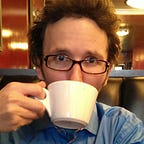Why Nintendo Abandoned Its Plans to Make You Healthier
The Switch is a success, but it certainly won’t help you sleep better
Near the end, mortality weighed heavy on the mind of Nintendo’s youngest-ever president. He ached. He was tired. But even as his own body failed, he was preoccupied with the health of his company — one that had shape-shifted through the ups and downs of an entire century — and the well-being of its fans.
When he died, Satoru Iwata was thinking of you.
Iwata began his career at 19, as a part-time programmer at HAL Laboratory in Tokyo. Twenty-two years later, he became president of Nintendo, shepherding the games giant through an era of intense experimentation that won new fans and lost old ones in equal measure.
Compared to rivals like Sony and Microsoft, Nintendo has always been seen as an eclectic toymaker. Across its 127-year history, the company has made extendable arms, pitching machines, light bulb–powered skeet shooters, “love testers,” electronic congas, and, of course, video games. Even so, when Iwata addressed shareholders in January 2014, the reveal was a stunner: Nintendo was making an aggressive move into the health business with a sleep-tracking device.
